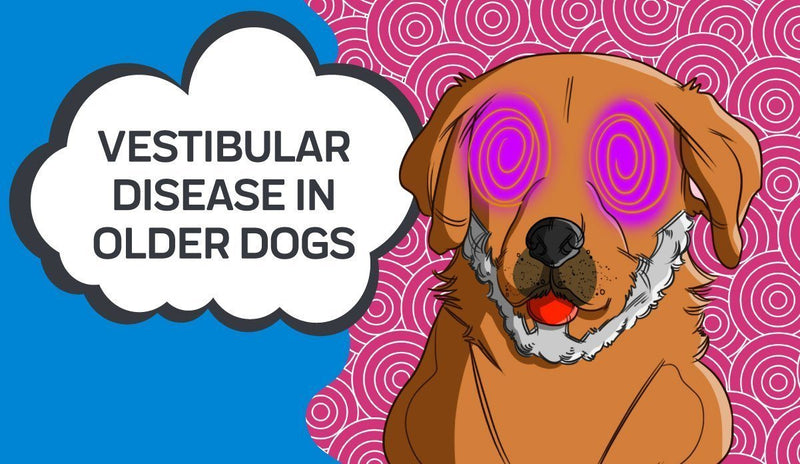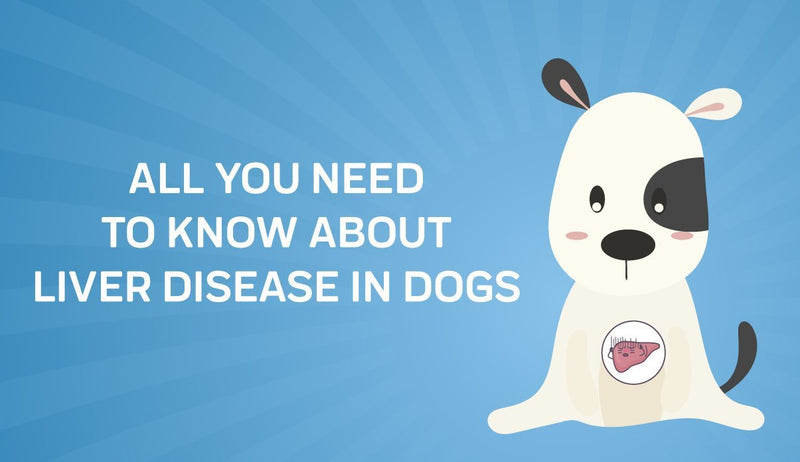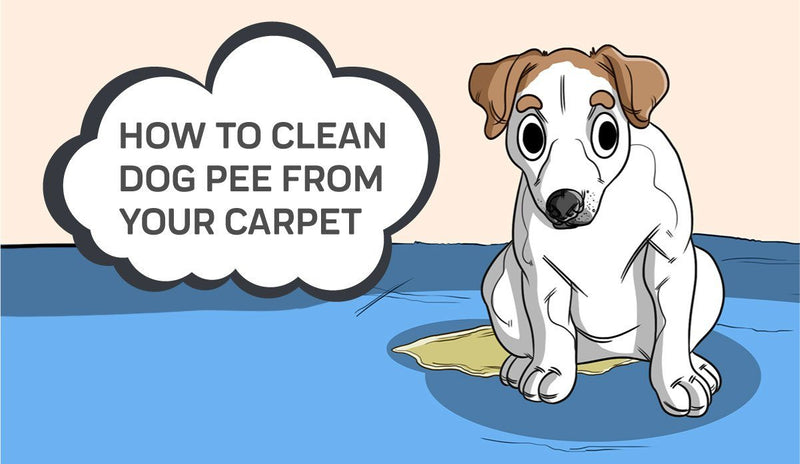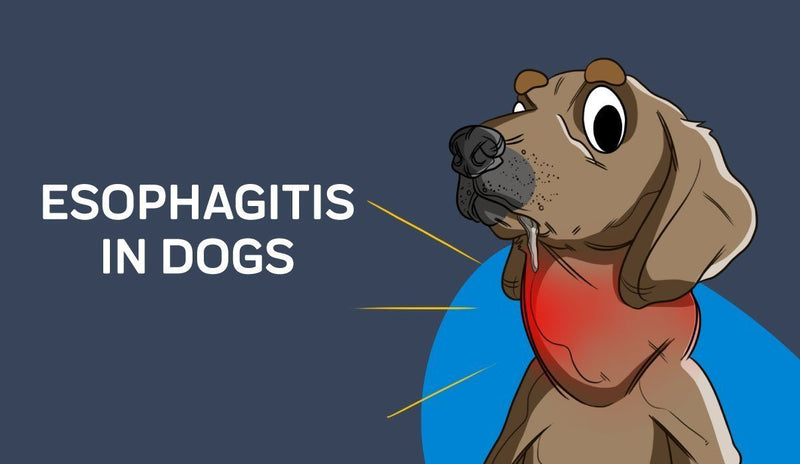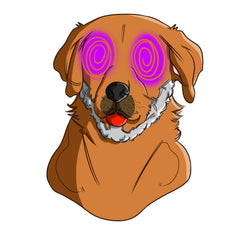
As your dog ages, you may notice some alarming behaviors that come from vestibular syndrome in older dogs. The dog may act dizzy, walk funny, or be unwilling to stand or walk. This is likely to freak you out, and you should take it seriously, but it is probably only inner ear trouble. Any dog can get vestibular disease, even puppies, but it is much more likely that it will occur in older dogs. So much so, that it is sometimes called old dog syndrome. Read this post to learn about vestibular disease in older dogs, including its symptoms and treatment.
Vestibular Syndrome in Older Dogs
Vestibular disease is a problem with the inner ear that causes them serious balance issues.
The name comes from the word vestibule, with means hallway or anteroom, and it is called that because the vestibular system that connects the inner ear, middle ear, and brain is like a passage. The balance within it is crucial to your dog's perception of balance, the rhythm of their paws, and awareness of their surroundings.
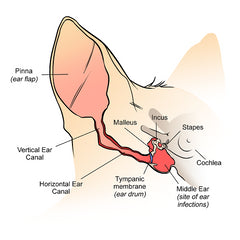
If you've ever been dizzy or had a stopped-up ear, you have some idea of what a dog with vestibular disease is going through. You couldn't move normally and sometimes just standing or even sitting felt unstable. It made you feel weird and nauseated.
Vestibular disease so commonly impacts older dogs because things just don't work as well anymore, and this is a complex and delicate system, prone to suffering from the least provocation.
Thankfully, vestibular disease is not dangerous in itself. The risks it does pose are secondary. The dog may hurt themselves, or they may be so unable to stand or so nauseated that they stop eating and drinking. You should always take symptoms of the disease seriously for two reasons. One, they are also shared with life threatening illnesses that need prompt treatment. Two, you need to know how to properly care for your dog to keep them safe, calm, and healthy.
Vestibular disease in old dogs is episodic
This delicate and sensitive system changes depending on various factors, meaning your dog can be better or worse at different times. Nasal congestion from a cold, allergy, barometric pressure changes, or an infection could make the dog much worse. An infection or cold will require treatment. For allergies, you could try to limit the dog's exposure to the allergen.
This means that if one of these things is occurring and your dog is in dire straits with their vestibular symptoms, know that they don't have to stay that way. If your dog suddenly gets much worse, this could be because one of these things is occurring. You might want to take the dog to the vet to ensure it isn't something that needs particular treatment.
It is likely that your dog may go long lengths of time between episodes and have no symptoms, or they may get dramatically better and have only some lingering symptoms. Depending on the factors involved in the episode, they may not have another one at all.
Causes of vestibular disease in older dogs other than age
Just because your dog is getting on in years doesn't mean that it is the only potential cause of a vestibular problem. They might have been exposed to a toxin or venom, suffered an injury, have developed hypothyroidism, or have an infection. You should take them to a vet and ensure that the vet considers all the viable possibilities.
Symptoms of vestibular disease in old dogs
The symptoms of vestibular disease include:
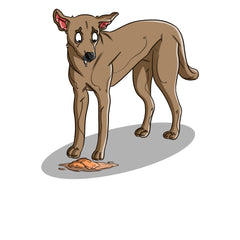
- an odd gait
- "drunk" movements
- wobbling
- stumbling
- turning in circles
- unwillingness or inability to stand or walk
- falling
- disorientation
- rolling
- a slight or extreme tilt of the head that is not associated with noise
- leaning, toward the head tilt or leaning without a head tilt
- irregular eye movements like jittering, jerking, or darting
- bathroom accidents, because they don't want to or can't go outside
- hesitance to eat or drink
- nausea or vomiting
- anxiety or irritability
The symptoms of this disease will have rapid onset. Depending on the severity, they may have a small or large number of these symptoms and they may impact the dog more or less.
It is common for pet owners to see their dog suffering these symptoms and become very upset, thinking something is terribly wrong with their dog. Try not to freak out. You will be putting yourself under excessive stress and make the dog more upset.
You do need to get them emergency care, in case it is something serious that requires immediate treatment. Just think that you're ruling it out and go about getting the dog to the vet in the calmest way you can manage.
Diagnosing vestibular disease in older dogs
It is important to rule out other potential causes for the dog's symptoms. The vet will need you to tell them everything you can think of about odd things the dog has done like been near chemicals, potentially been stung by an insect, or been injured. Any odd behavior that may be a symptom of vestibular disease or any other disease, particularly ones such as stroke, tumor, infection, or poisoning, will be helpful. But tell them anything.
The vet will examine the dog for symptoms they can see in the office and check their ears for signs of inflammation. The dog may resist anyone messing with their ears as they are protective of areas that there is something wrong with. Try to keep them calm by talking to them in a soft, loving voice and petting them in a soothing way.
The vet will probably lift the dog's paw and flip it over to check if the dog can return their paw to its normal position on their own. Not being able to do this is a sign of stroke.
Blood tests and urinalysis will also help rule out other problems. They may perform an MRI to check the brain, but they'll likely try other things to address the vestibular disease before going so far as an MRI unless symptoms point to this being the primary concern.
Old dog vestibular disease treatment
If the symptoms of vestibular disease are caused by something like an infection or tumor, then that will have to be addressed. While the dog is undergoing treatment, they'll probably still have symptoms, so the treatment for the vestibular symptoms will be the same as what follows below.
A dog that can't eat or drink or has become dehydrated because of vestibular disease may be kept at the vet's office to be given fluids and fed until they are able to eat and drink by themselves.
Otherwise, old dog vestibular syndrome treatment is the same as vestibular syndrome treatment in any dog, requiring rest, time, and the potential for medications to help manage symptoms.
Episodes of vestibular disease in dogs usually show some improvement in 72 hours and may be completely overcome anywhere from a few days to a month. Some dogs will always show some residual symptoms. During their recovery, you will want to protect them, keep them calm, and lessen their symptoms where possible.
Medications may be given to address nausea and dizziness and to relax the dog, so they aren't as anxious and aren't as likely to get a rambunctious streak and hurt themselves.
Corticosteroids have been used in the past for vestibular disease, but its effectiveness is in doubt.
It is important to change what you can in the home to keep them safe from falling or running into something or something falling on them. Keep them in one room if you must. Don't let them use stairs by themselves. This may require a baby or pet gate. They should be discouraged from getting on furniture during this time. It may be necessary to carry very ill dogs outside to go potty. If you can't do this, get them some potty pads. It's also a good idea to place their food and water, and the potty pads, somewhere fairly near where they are spending their time, so they don't have to locomote far to use them. This makes it more likely and safer for them to use them.
Beyond keeping the home safe, you also want to keep the dog as stress-free as possible. Love them, try to maintain a lower stress level in the home, spend quality time with them if they want it, let them be alone if they want it, and place their favorite things where they can easily get to them. Where possible, eliminate the sound of the doorbell, people coming to visit, changes in the home, and other things that negatively excite the dog.
Don't sneak up on them, rather let them know you are coming. They probably feel disoriented and you don't want to freak them out with sudden movements and sounds. Be prepared that they are probably jumpy and even irritable and may act out.
Keeping old dogs with vestibular disease away from other pets and children
This disease is not contagious, so you don't have to worry that they'll give it to pets or humans. There is concern about whether they can be hurt by or will hurt pets or family members.
If they are anxious and irritable, they might nip or bite. They could also fall on a smaller pet or a child. Pets and children who don't understand that the dog can't play like they normally did or protect themselves like they used to may hurt the dog.
Letting them spend time with their family members in as normal a way as you can manage is probably good for their stress level, just make sure you or another trusted adult are always present to make sure nothing gets out of hand.
If you manage to have multiple pets or family members in your home displaying similar symptoms, it doesn't mean anyone caught it from anyone. It just means multiple people and animals in the home have inner ear troubles. You are likely to all suffer bouts with it at the same time if an allergen or a barometric pressure change is exacerbating the problem. Impacted individuals may also all have been exposed to a toxin.
Old dog vestibular disease recurrence
Any dog who has had an episode of vestibular disease symptoms is likely to have one again. Older dogs are more likely to have recurrences. Don't be shocked if your dog completely recovered and then has another episode, possibly even worse than the one before, though it doesn't have to be.
This just means the inner ear is still prone to having this problem when the conditions are right. It is still wise to take them to the vet to ensure there isn't a new cause this time or that it isn't something else similar, but it is probably vestibular disease rearing its ugly head again. How often and how severe the recurrences will be unclear because there are too many factors. Just learn from each time so you can best take care of your dog.
Old dog syndrome treatment not working
Your dog should show marked improvement within 72 hours to a week. If this doesn't happen, they may have been diagnosed incorrectly. Contact the vet or another vet for another evaluation.
Many dogs with vestibular disease, even old ones, go back to their normal selves within a week to a month. But some will permanently have a tilt or act wobbly, particularly when trying to do certain things, or retain a small number of probably not severe symptoms. You should still call the vet to see if they think the dog should be seen again
How CBD Oil May Help with Vestibular Syndrome in Older Dogs
CBD oil is growing in popularity as a gentle, natural method of addressing a dizzying amount of pet ailments.
CBD oil might help with an episode of vestibular disease in older dogs by:
- alleviating stress
- easing nausea
- providing a sedating effect
- alleviating pain from an injury
- reducing inflammation in the site of an injury
- soothing bed sores
- preventing infection in wounds and sores
- killing infections in wounds and sores
- easing the side effects of medications
The greatest concern associated with vestibular disease is the dog becoming unable to eat and drink. This is why the vet often prescribes medication to treat nausea, but the dog may not be able to take it. CBD oil is a gentler alternative.
Dogs with inner ear troubles are disoriented and unable to take care of themselves, which makes them anxious. If you've had inner ear troubles, you understand how the disorientation drives you a bit crazy. CBD oil is commonly used to alleviate anxiety in humans and pets, so you may want to try it to see if it will help your dog cope during this trying time.
Vets also sometimes prescribe sedatives to dogs with vestibular issues. If your dog can't take these medications, CBD oil might be used in their place as it can have a sedating effect with the right dose. That last part is important though. Smaller doses of CBD oil have a slightly energizing effect.
If the dog hurts themselves because of vestibular disease, CBD oil can be given to them orally or topically in localized areas to perhaps reduce their pain and inflammation.
Dogs may lay down a lot when they're suffering from an episode with vestibular disease, which is good in one respect, because it keeps them from injuring themselves, but too much laying down can cause bed sores. A topical CBD oil can be used in an attempt to soothe the sore, prevent infection, or kill existing infection.
You can get the following CBD oil for your pet:
- oil tinctures
- extract concentrates
- capsules
- crunchy treats
- soft treats
- topical balms
CBD oil hasn't been studied and tested enough so far to gain FDA approval, but it is exciting scientists because it shows promise at addressing so many ailments. What has been proven is that humans and pets have an endocannabinoid system that creates and uses cannabinoids to maintain homeostasis in the body. External cannabinoids like the cannabidiol in CBD oil interacts in the body like its own cannabinoids to address deficiencies and provide a boost.
Without FDA approval, we can't make promises. While traditional medications are scary for their side effects and risks, vets also have a firm grasp of how likely they are to work. The same can not be said about CBD oil yet. It has miraculous effects with some pets, and humans, but there is no guarantee. For pain or life-threatening illnesses like infection, be prepared with a more aggressive back up plan should CBD oil not work.
Innovations from Innovet
We create scientifically-backed eco-friendly and natural solutions to address pet problems. If you're searching for vestibular treatment for dogs, you might like our CBD oil products as natural alternatives to traditional treatments. We offer CBD oil tinctures, treats, capsules, and balm to work where traditional treatments can't or relieve symptoms of medications so a traditional treatment can still be used.
Sometimes pet owners encounter cases of disease or another pet-related problem that no current method fixes. If you do, contact us. We love to innovate for pets and pet owners.
Sources:
Vestibular Disease in DogsAcute Vestibular Disease in Old Dogs
Vestibular Disease
Clinical signs, MRI findings and outcome in dogs with peripheral vestibular disease
Idiopathic or Old Dog Vestibular Disease










